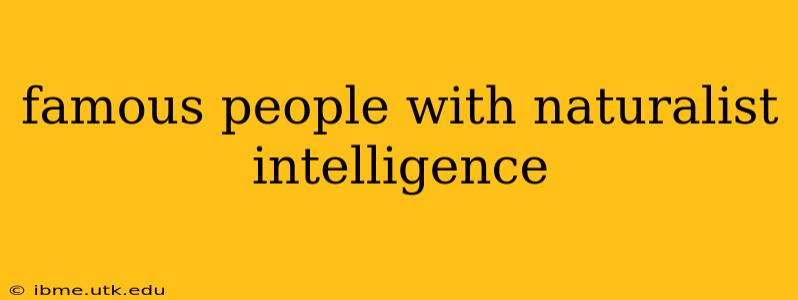Naturalist intelligence, one of the multiple intelligences proposed by Howard Gardner, involves recognizing and classifying plants, animals, and other aspects of the natural world. Individuals possessing this intelligence demonstrate a deep understanding and sensitivity to the natural environment, often exhibiting exceptional skills in observation, pattern recognition, and categorization within the natural world. While Gardner's theory doesn't lend itself to precise measurement, we can identify numerous famous figures who clearly displayed a strong naturalist intelligence, influencing their work and lives significantly.
Who are some examples of famous people with naturalist intelligence?
Many famous individuals, across various fields, showcased a keen naturalist intelligence. Let's explore some notable examples:
1. Charles Darwin: This name is synonymous with naturalism. His groundbreaking theory of evolution by natural selection stemmed from years of meticulous observation of flora and fauna during his voyage on the HMS Beagle and subsequent research. Darwin's exceptional ability to recognize patterns in the natural world, categorize species, and formulate a revolutionary theory firmly establishes him as a prime example of someone with high naturalist intelligence.
2. Jane Goodall: Goodall's groundbreaking research on chimpanzees revolutionized our understanding of primate behavior. Her decades-long study in Gombe Stream National Park demonstrates an unparalleled capacity for patient observation, nuanced understanding of animal behavior, and a deep connection with the natural world. Her commitment to conservation further highlights her exceptional naturalist intelligence.
3. David Attenborough: A broadcasting legend, Sir David Attenborough's career has been dedicated to sharing the wonders of the natural world with millions. His remarkable ability to communicate complex ecological concepts, his keen observational skills, and his profound respect for nature all speak to his strong naturalist intelligence. He effortlessly translates intricate natural processes into engaging narratives accessible to a wide audience.
4. Rachel Carson: A marine biologist and conservationist, Carson's book Silent Spring alerted the world to the devastating effects of pesticides on the environment. Her insightful observations and ability to connect seemingly disparate pieces of environmental information resulted in a landmark work that significantly influenced environmental policy. This exemplifies a powerful combination of naturalist intelligence and a passion for environmental protection.
5. Dian Fossey: Known for her extensive study of mountain gorillas, Fossey's dedication and profound understanding of gorilla behavior are testaments to her strong naturalist intelligence. Her work, despite its tragic end, significantly advanced our knowledge of these magnificent creatures and brought attention to their conservation needs. Like Goodall, she combined keen observation with a deep commitment to protecting her subjects and their habitat.
What are some common characteristics of people with naturalist intelligence?
While not exhaustive, individuals with strong naturalist intelligence often share certain characteristics:
- Keen Observation Skills: They are incredibly observant, noticing subtle details in nature that others might miss.
- Pattern Recognition: They can identify patterns and connections within ecosystems and the natural world.
- Classification Skills: They can categorize and classify plants, animals, and other natural phenomena effectively.
- Environmental Sensitivity: They are highly sensitive to changes and disruptions in the environment.
- Love of the Outdoors: They often have a deep appreciation for and connection to nature.
- Respect for Nature: They tend to have a strong sense of responsibility towards protecting the environment.
How can I develop my naturalist intelligence?
Even if you don't consider yourself a "naturalist," you can cultivate this intelligence. Some suggestions include:
- Spend time in nature: Engage with the natural world through hiking, gardening, birdwatching, or simply observing your surroundings.
- Learn about plants and animals: Explore field guides, documentaries, and online resources to expand your knowledge.
- Practice observation skills: Pay close attention to details in your environment, noticing changes and patterns.
- Engage in citizen science projects: Contribute to scientific research by participating in projects related to nature.
By understanding and appreciating the significance of naturalist intelligence, we can better recognize and celebrate those who possess it, and also work towards cultivating this vital capacity within ourselves to foster a deeper appreciation and respect for the natural world.
